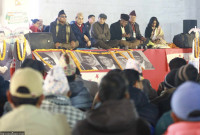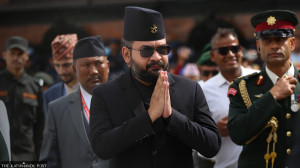Opinion
Reward and responsibility
With public figures, we must encourage brave, practical decisions while shaming selfish, political ones
Sophia K Tamot
Now pose the same question to a politician, a businessman, a civil servant, a teacher, a parent, even a spouse and the answer is almost never a yes; at least not in public.
We come across such behaviour every day, across several sectors. It has now so deeply infiltrated our lives that we often choose to ignore it at will, even at the risk of being complacent.
Ingrained behaviour
I can bet that you will find at least one of these situations familiar. The vegetable vendor that tips his scales ever so slightly so that you end up paying more but getting less. The teacher who generously marks an extra 10 points for his favourite student. The judge who takes a fat envelope from under the bench for a ruling that has been fixed in advance. The politician who pockets anywhere between one and 10 percent of the project cost as a side commission to facilitate the process. The bureaucrat who indulges less in his tasks at hand but more in making his superiors happy so that he can get promoted in good time. The businessman who builds an empire by evading taxes and creating an artificial monopoly. You get the point.
When we now read more and more about individuals being charged and arrested left, right and centre, it appears that watchdogs like the Commission for the Investigation of Abuse of Authority are finally doing their job and bringing the guilty to book. Granted, surveillance does not necessarily make us morally better but it sure does help. Take for example, the zero tolerance policy on alcohol while driving. Statistics will tell you that this has resulted in a sharp fall in the number of accidents, especially motorbikes, and in the process helped prevent human casualties. One could also expect that certain enforced repetitive behaviour can grow to become a natural habit but again, to assess this properly, only time can tell. The win-win effect here is that it has also become the number one revenue earner for the metropolitan traffic police. All this so far is an obvious upside.
Under scrutiny
The corollary to this phenomenon, now on the downside, is that individuals in office, whether in the public or the private sector but much more so active in the former, are becoming so loss averse that it has resulted in cognitive inertia. What has set in is a sweeping apprehension towards the entire decision-making process, provoked by a fear of falling under scrutiny. Whether making such a decision could be right or wrong has become totally subjective and this has given birth to the trend of passing the buck.
Look around. Remember the time when the garbage person failed to meet his thrice-a-week pick up because the authority that manages the disposal site could not decide whether or not to agree to the proposed rental hike on time? Or even now, when 45MW of electricity that should have been flowing to our homes is not, not because there are technical problems associated with the transmission but simply because various political parties are squabbling for a greater share in project equity.
Nobody should have the right to misuse authority at the cost of accountability. But like all other problems we face every day, people concerned either shrug it off, arrange a transfer—this is generally somebody low in the food chain, avoid the issue altogether, and end up conveniently passing the buck. No further questions asked.
Idolising integrity
However, it is high time the public started asking questions, the right ones, the ones that we still seek a credible answer to. But the public’s role should not be limited to merely raising concerns, identifying problems, and issuing complaints. We must also enthusiastically encourage individuals who in spite of all the mayhem, are sincerely going about their daily business and diligently serving society and the country. They ought to be recognised and their achievements celebrated.
A new reality show on television promises to put this to the test by encouraging the public to vote for and recognise committed and honest civil servants. By idolising integrity, the show also hopes to encourage the new generation to build trust in government and inspire interest in careers in the public sector. A show alone will surely not be able to achieve such an ambitious goal, but the rest of us can take a cue and do our bit. That includes the government and the people.
The government must look for models it can replicate. Singapore’s governance model has successfully incorporated the cross fertilisation of personnel, along with competitive pay between the private and public sector, boosting public performance and confidence but reducing government spending. So the right package seems to include a good mix of incentives, competition, innovation, and surveillance followed by recognition.
We, on the other hand, as an informed public, must encourage and publicly laud brave, practical decisions and identify and shame political or self-motivated decisions. This requires proper homework as there are two sides to every story and this is not acquired by just reading op-eds.
We must also go one step further by voicing our support to stand by those individuals brave enough to make hard choices, irrespective of being under duress. So when question time does come, we are physically present with our placards and voices to demonstrate to the world that nobody can fool all of the people all of the time.
Sophia K Tamot is a consultant at the Investment Board and works closely with the government and the private sector




 17.12°C Kathmandu
17.12°C Kathmandu










